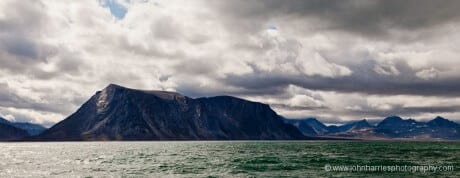
I believe it was the explorer Cartier who christened Labrador “The Land God Gave to Cain”. Obviously he was no fan of Labrador’s barren mountains and often gale lashed and fog surrounded shores.
We made landfall at Cape Chidley, the northern tip of Labrador, two days ago after a blessedly easy crossing of Hudson Strait with its fearsome combination of tides that can run up to seven knots, violent weather, ice and frequent fog.
As we approached at dawn, the black mountains of Labrador appeared out of a thin mist rising vertically from the sea with jagged rocks at their base over which a huge swell from a gale to the north was breaking—a landfall that certainly had the potential to justify Cartier’s name for the place.
Two hours of careful navigation through the rock garden that surrounds it and we were anchored in snug Bowdoin Harbour, named after Macmillan’s Arctic exploring schooner that is now a sail training ship at Maine Maritime Academy. Particularly fitting since Hannah Gray, our crew for this segment of the voyage, is sailing master at MMA and has sailed extensively on Bowdoin as chief mate.
Yesterday we started south through the barely charted and intricate inshore passage between the feet of the Torngat Mountains and the line of skerries that lie just offshore. Sunlight breaking through a scudding overcast and an offshore breeze that blew away the fog let us see vista after vista of this stunning glacier-formed land. Green carpeted valleys alternated with vertical black rock faces towering several thousand feet into the clouds. And our view was up close too since the route is rarely more than a mile and often less than a quarter mile offshore.
Today we are anchored behind a moraine spit at the mouth of a fjord. The rushing sound of a stream tumbling down from the heights competes with the lapping of a slight swell on the gently shelving beach to provide us with background music.
And just a few hundred yards away a polar bear has spent an amazingly warm day dozing and sunning him or herself. (I’m not getting close enough to determine gender!)
This is my third trip to north Labrador. I first saw this land from the deck of Morgan’s Cloud 18 years ago and after three visits I can say conclusively that, for me at least, Cartier was wrong and the Labrador Inuit right, for they call their homeland Nunatsiavut, which means Our Beautiful Land.
Hey John !
Nice post. Again!
We should stop building boats and go sailing up North.
Have you crossed Boréalp, a Boréal 50 who was sailing in those areas this summer? And my very, very good friend Eef from Tooluka (rather in Greenland)?
Enjoy !!!!!
Jean-François
Hi Jean François,
Thanks for the kind comment. No we have not seen them, but we would like to very much in that we have never seen a Boréal in the “flesh”.
I agree about the Labrador coast. It’s very beautiful. Some of my favorite cruising ground.
I often wondered about that statement, “The land god gave to Cain”. Who is this Cain it speaks of? God gave it to us all other wise we would not be here. We are the keepers……
Hi Lyall,
As you say, “we are all the keepers” and not just of Labrador…
John and Phyllis,
I am enjoying my free book with subscription. I wonder if you have ever stopped in the coastal Labrador outports of Spotted Island, Black Tickle, or Batteau-communities where I worked in the early 70’s and remember with great affection. b
Hi Bruce,
Yes, been into Batteau several times over the years and Black Tickle five years ago. Very little left at Batteau, just a few falling down cabins. Black Tickle is still going but with the plant closed there is little on the go and the young people are mostly leaving, so a bit sad.
Just prior to my arrival, teachers had been removed by the Province from Spotted and Batteau and the residents had relocated to Cartwright where many of them became dole recipients for the first time. Because Black Tickle was a catholic community, their priest-teachers weren’t affected and it remained a year-round community. It was so isolated, even from TV, that it was used as the control group for social science research on the impact of TV on child creativity. The community was very inbred and had, as a result, an incredibly high rate of the rheumatic disease, lupus.